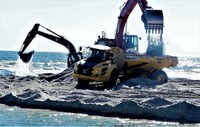GULF SHORES, AL — State struggles with keeping Little Lagoon Pass open are continuing and residents along the lagoon are beginning to show frustration.
“How much time do they need to have,” …
This item is available in full to subscribers.
Please log in to continue |



GULF SHORES, AL — State struggles with keeping Little Lagoon Pass open are continuing and residents along the lagoon are beginning to show frustration.
“How much time do they need to have,” resident Steve Kichler said. “They keep telling us they need more time to see if the pass is going to work. Well it’s been less than a year and they’ve had the dredge equipment in there more than it’s not been in there. So, their design didn’t work.”
According to Kichler the pass has been completely blocked by sand several times in the latter part of 2016. Equipment has been operating at the mouth of the pass for the past few weeks removing the sand.
In the 1980s the Little Lagoon Preservation Society sued the state over the pass and the resulting court order said it was the state’s responsibility to maintain a constant water flow from the lagoon to the Gulf of Mexico.
Society members say the flowing water is vital to the health of the lagoon and they say it is suffering because of the near constant closures.
“The water quality is just getting bad,” Kichler said. “Part of it is because of development. The other part is, of course, because the state refuses to fix the pass correctly. The bottom line is the water quality is suffering in the lagoon, fish populations are dropping severely.”
Kichler grew up on Little Lagoon and said his family has lived in the area since 1861. He estimates the state has spent close to $30 million at the pass.
The most recent expenditure was about $12 million for a new bridge over the pass. During that work the pass was also widened.
“What could the state do with $26 million to $30 million now?” Kichler asked. “Every time we turn around we don’t have the money for this, we don’t have the money for that. I’d love to know the number.”
Vince Calametti, the southwest Alabama engineer for the Alabama Department of Transportation, says the natural flow of water and sand is responsible for closing off the pass.
“The littoral drift, the sand that moves in the Gulf, it moves from the east to the west,” Calametti said. “As that sand gets to the pass, the pass stops that movement. So as part of the court order we have to clear the shoaling on the south end. We move it to the west to put it back in the system.
“We manage the pass in accordance with the court order. We had this same issue with the old pass. It’s a matter of keeping up with it as it happens.”
Kichler and other members of the preservation society would like to see a long-range solution. They believe that a rock jetty on the east side of the pass jutting out into the Gulf could solve the constant closures.
“I’ve heard that conservation,” Calametti said. “But if you extend the jetties you run the risk of down-drift erosion and we are very, very aware of that situation and we wouldn’t want to do anything to cause any kind of damage to the west.”
Kichler says the time for patching and fixing as the problems keep recurring has passed.
“They’ll give you a vague reason why they won’t put the jetties out there,” he said. “They just keep referring back to the coastal engineers and they need to do more study. It’s been going on for 25 years. How much more studying do you need? If the coastal engineer can’t figure it out, then maybe you need to find another coastal engineer.”
Kichler says he believes the state is afraid if it tries the jetty solution, beachfront homeowners west of the pass will file lawsuits.
“Who has the priority?” Kichler asked. “Is the water quality of this body of water more important than a handful of people who have a house on the beach?”